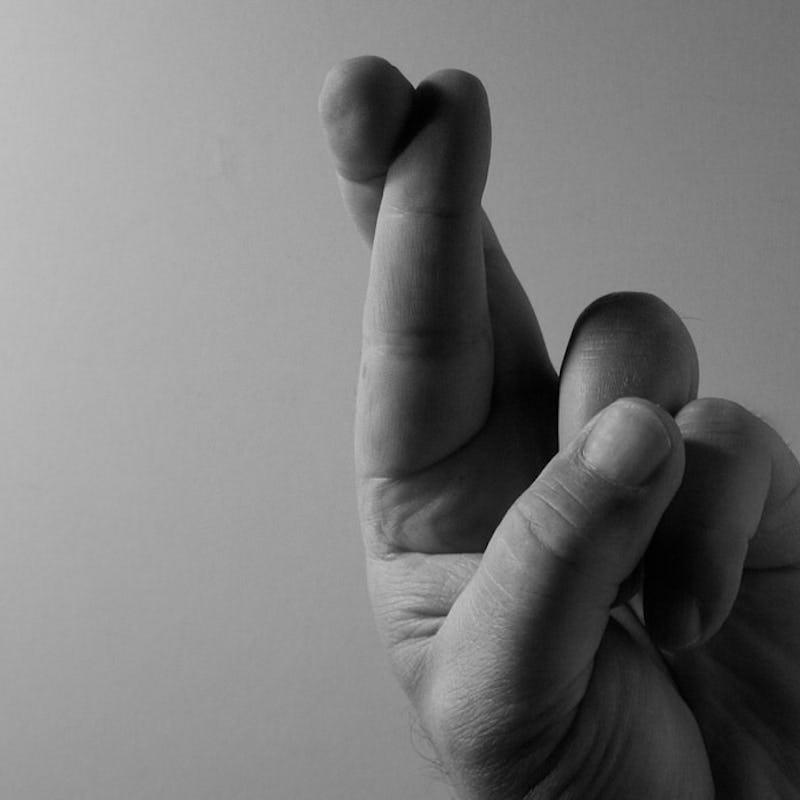How Superstitions Work (For Real)
Throwing salt over your shoulder is dumb, but it isn't a waste of time.

Superstitions are to October what groundhogs are to February: They come out of hiding. Not only is it Halloween, which comes with its usual horde of black cats and sugar skulls to ward off the dead, it’s the baseball playoffs. Chicago Cubs fans alone have already sacrificed goats, done special handshakes, and taken solemn oaths not to shave till the end of the season. This quest to bottle luck, or ward off its opposite is — depending on where you’re standing — ridiculous.
But that doesn’t mean it lacks efficacy. A series of scientific studies on the topic suggest that there is good reason to take what scholars call “magical thinking” seriously.
“Magical thinking and superstition build on basic processes of who we are,” says Jane Risen, a behavioral scientist at the University of Chicago. “We are built to try to understand things, and this is how we do it. We’re not going to suddenly change.”
There is a thought process behind the bovid bloodletting. In his 2011 hit book, Thinking Fast and Slow, psychologist Daniel Kahneman divides thinking into two systems. System 1 is responsible for the “fast,” immediate reactions we have, which are often more impulsive and emotional. System 2 is responsible for “slow” responses, which tend to be more thought out and rational. Superstitions are produced by System 1, but are generally acted upon slightly more slowly (outfielder Moises Alou could have re-thought peeing on his hands before games). This makes superstitious behavior stand out, and because most people fancy themselves educated and open to facts, suspect. No wonder people tend to hide their good luck routines.
“People should be correcting superstitions and realizing they don’t work,” Risen said. Yet rational, logical humans still perform bizarre superstitions to hedge against negative situations. Risen defines this as the acquiescence model: System 1 gives a command that System 2 should reject, but doesn’t because something about it makes sense in the moment. It’s not entirely clear to Risen why System 2 doesn’t just jump in at this moment to inform System 1 it’s making a crucial error, “but this suggests that people are actually recognizing the superstition, and ignoring the error message to correct it.” In other words, people know it’s dumb to be superstitious, but something about it is rewarding, despite its irrationality.
Juliana Schroeder, a social cognition expert, has one theory about what that reward mechanism could be. She studies rituals that manifest as “a fixed sequence of patterned behaviors and tend to have symbolic meaning beyond reactions, and lack an overt instrumental purpose” — otherwise known as superstitions. Naturally, Schroeder and her colleagues wanted to see if any of these behaviors worked.
To do this, the researchers created what Schroeder called “anxiety-inducing tasks,” like doing karaoke in front of peers or evaluated math tests. “We either had them do nothing, and told them to just calm down, or we had them do stuff that was completely random” — the ritualistic superstition, in other words. One of those superstitions that fit the bill of the definition was the following, according to the paper:
Please do the following ritual: Draw a picture of how you are feeling right now. Sprinkle salt on your drawing. Count up to five out loud. Crinkle up your paper. Throw your paper in the trash.
Participants who were performing the “superstition” had one minute to do so; participants in the control group were to sit quietly for that minute.
The results of Schroeder’s inane fake superstition are surprising and back Risen’s theory of superstitions: After the salt sprinkling stunt, participants reported being less anxious, with more normalized heart rates, compared to the control group, which led to better performance. The superstition worked.
What Schroeder calls “low-level rigid behaviors” might work for one of several deeply ingrained reasons. The obvious one is that the person acting on the superstition genuinely believes there is a direct causation between throwing salt and karaoke excellence. But most people wouldn’t buy that. A more probable reason, in many cases, is bonding. Consider, again, the Chicago Cubs: Fans have bonded over the “lovable loser” name, robotically shrugging, “There’s always next year!” in an attempt to rise above the crushing disappointment of another season without a World Series win. This is not unlike an impulsive “bless you” after someone sneezes. It’s tribal behavior that bonds us. It’s shorthand for: “Hope you’re not sick; also, I’m like you!”
The third reason is the one that’s harder to talk about. Superstitions supply people with a way of exerting control on situations that they can’t actually control at all. When people are anxious, they do things in a rigid way to impose order in their environment, Schroeder says. This doesn’t lead to environments becoming ordered, but it can help people order their own perceptions and behavior.
Schroeder has a paper under review that attempts to explain what it is about self-control that makes us feel better. After all, no matter how rational the population becomes, non-rational behaviors are universal: “We take deep breaths. We close our eyes. We say they’re random, but they’re not,” Schroeder says, pointing to a cultural fascination for meditation and rigid yoga as a way to feel relaxed as an example. Is it all an attempt to deal with a busier, more chaotic, less structured world? Schroeder can’t say for sure, but suggests our scoffing at ritualistic behaviors, as old-fashioned and inherently irrational, is hypocritical.
Everybody has to get through the day. Everybody has to get through October. Science suggests superstitions — while silly — might help.